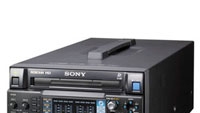Aberdeen makes closed captioning fast with XDCAM HD deck
The professional video industry's #1 source for news, trends and product and tech information. Sign up below.
You are now subscribed
Your newsletter sign-up was successful

Aberdeen Captioning, along with software developer CPC, has developed a file-based closed-captioning system that uses Sony’s PDW-HD1500 optical deck to make the process efficient, faster and more flexible.
Matt Cook, president of Aberdeen Captioning, said because the XDCAM HD (4:2:2 processing) system is file-based, captioners can work in a much more refined and streamlined way. Once someone is done with an XDCAM edit, the person doing the captioning takes the file, captions directly onto that file and then places it back onto the disc. Thus they have eliminated the need to go through a closed-captioning encoder‚ thereby eliminating the need to do real-time playout.
Cook added that users benefit from faster turnaround times and a more cost- and time-efficient process. “The primary benefit for clients is that they can keep their file in its original form, and send it to us on a hard drive, via FTP site, or on a disc,” he said. “Once we put the captioning data back in the video file, we can then return it to the client in the format of their choice.”
The PDW-HD1500 deck is designed for file-based recording in studio operations. A Gigabit Ethernet data drive allows it to write any file format from any codec onto the optical disc media, and it also makes handling either SD or HD content much easier.
When Aberdeen receives content from a client, the company first converts it to a smaller Windows or a Quick Time media file, which is used to do the transcribing, captioning and timing. Once the captioning work is done, they marry the original MXF XDCAM file and the captioned data file through Aberdeen’s MacCaption software. With the press of a button, both files are merged, and they can drag and drop it back onto the disc and send it out, or FTP it to a client and they can drag and drop onto a disc.
The professional video industry's #1 source for news, trends and product and tech information. Sign up below.
